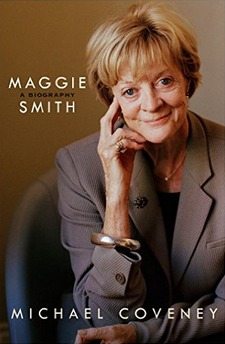
 In one of the most in-depth interviews she’s given in what has remained, a very much private life, Maggie Smith explained to Nancy Banks-Smith of the Observer how she perceived theatre, “I’m never shy on the stage. Always shy off it it. You see, the theatre is a different world. A much better world. It’s the real world that’s the illusion.” In Michael Coveney’s illuminating biography simply titled Maggie Smith: A Biography, he reveals her to be indeed one of the grandest “illusionists” stage and film have seen. Tracing her life from her childhood, all the way to becoming one of the most celebrated actors in the world, Coveney reveals a woman with a wicked sense of humor, a pragmatic, if slightly pessimistic worldview, and talent to spare.
In one of the most in-depth interviews she’s given in what has remained, a very much private life, Maggie Smith explained to Nancy Banks-Smith of the Observer how she perceived theatre, “I’m never shy on the stage. Always shy off it it. You see, the theatre is a different world. A much better world. It’s the real world that’s the illusion.” In Michael Coveney’s illuminating biography simply titled Maggie Smith: A Biography, he reveals her to be indeed one of the grandest “illusionists” stage and film have seen. Tracing her life from her childhood, all the way to becoming one of the most celebrated actors in the world, Coveney reveals a woman with a wicked sense of humor, a pragmatic, if slightly pessimistic worldview, and talent to spare.
In his thoughtful introduction, the author establishes that Dame Maggie “like the greatest of vaudevillians, believes that she only properly exists in the spotlight”, and as such has made sure to avoid being in the public eye for the wrong reasons. She does not appear on talk shows, rarely, if ever, attends award shows (despite having won a Tony, two Oscars, three Emmys, three Golden Globes and five BAFTAs, among other trophies…) and seems to be rather unaware of her gifts, usually recurring to self-deprecation when describing her work, as others around her seem to be in endless awe of her, Richard Burton even accused her of committing “grand larceny” after she stole her scenes in The V.I.P.s.
Rather than being someone who’s constantly putting on a performance of faux humility, Coveney reveals Smith to be a woman who has constantly been trying to prove herself, because acting, unlike becoming famous for acting, wasn’t something that came easy to her. Her mother, a secretary from Glasgow, failed to incur self-confidence in her youngest, and only, daughter suggesting she didn’t have the right face to be onstage, this might have lead to Smith being skeptical of close-ups on film, while ironically inspiring one of her best roles, “[she would] draw almost callously upon [her mother’s] icy temperament and brusque organisational manner in her Oscar winning performance in The Prime of Miss Jean Brodie”, explains Coveney.
But Smith’s life isn’t filled with villains and antagonists; in the book, it comes through as being populated with extravagantly beautiful characters, who might not have always been nice, but were certainly never not interesting. Twice married, and once a widow, Dame Maggie has developed her biggest love affair with her work, from which she seems to draw all her power and comfort, in the same Observer interview she added “[the stage] is a world whose timetable is more precise than anything else on earth. Outside, trains can run late. But trains in the theatre are always on time...It’s strict. It’s secure.”
Featuring anecdotes and interviews with some of her contemporaries (Dame Judi Dench sharing Maggie Smith’s shopping advice is a true gem), one might wonder at times if the book feels incomplete without Smith’s constant input, but Coveney is too clever an author to make the book feel dishy or needlessly intrusive. Rather Maggie Smith: A Biography makes for a fascinating historical document in which Britain’s unique theatre tradition is explored through one of its key players, it also chronicles America’s fascination with British actors by smartly discussing a lady who saw Daniel Radcliffe’s potential before the Harry Potter movies even happened. Dame Maggie, as written by Coveney, remains very much an enigma through the end, but one we will never get tired of trying to solve.